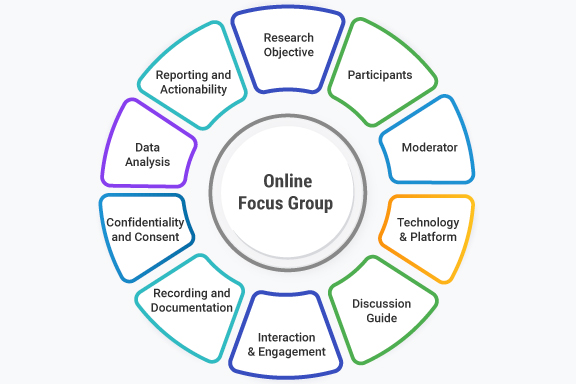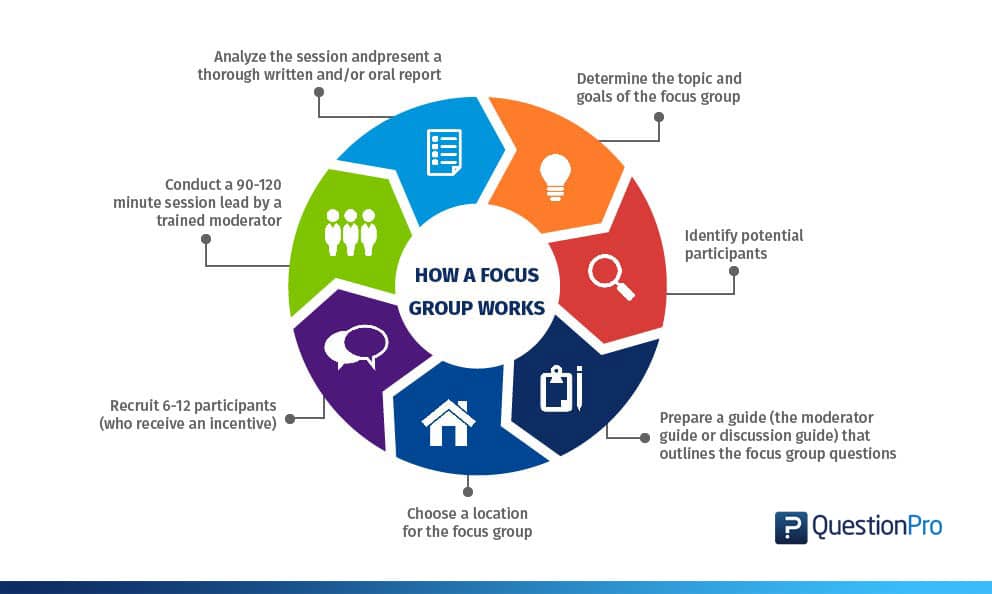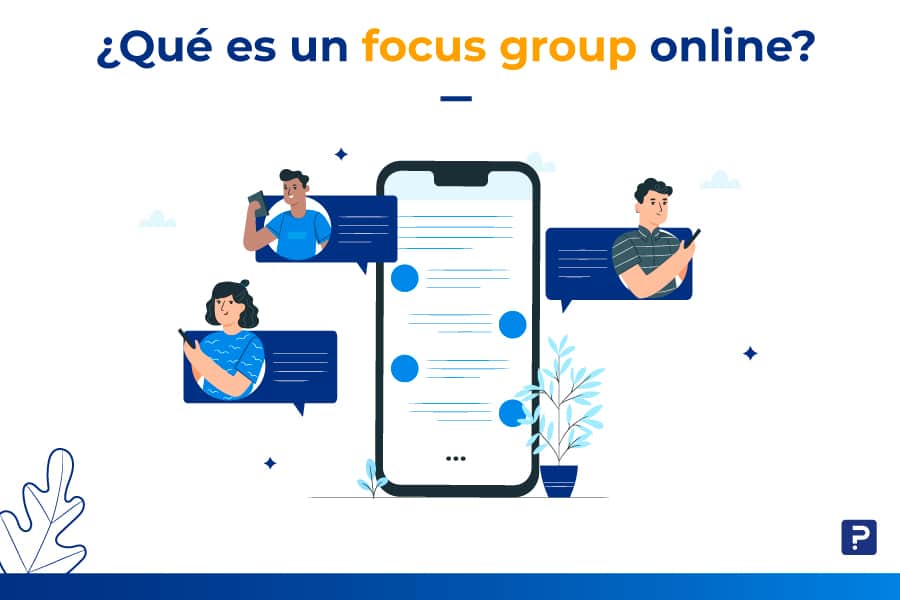What is an Online Focus Group and How Does it Work?
An online focus group is a virtual gathering of individuals with shared characteristics, demographics, or interests, brought together to discuss and provide feedback on a specific topic, product, or service. This innovative approach to market research allows businesses and organizations to gather valuable insights from a diverse group of participants, without the need for physical presence. Online focus group firms facilitate these discussions, providing a platform for participants to engage with each other and with the moderator, who guides the conversation to ensure that the desired information is collected.
The online focus group process typically involves several stages, including participant recruitment, screening, and selection. Online focus group firms use various methods to recruit participants, such as social media, online advertising, and partnerships with market research panels. Once participants are selected, they are invited to join the online focus group, which can be conducted via video conferencing software, online forums, or other digital platforms.
During the online focus group, participants engage in discussions, answer questions, and provide feedback on the topic at hand. The moderator ensures that the conversation remains on track, and that all participants have an opportunity to contribute. Online focus group firms also provide transcription services, data analysis, and reporting, to help businesses and organizations make sense of the feedback and insights gathered during the discussion.
By leveraging online focus groups, businesses and organizations can gain a deeper understanding of their target audience, gather feedback on new products or services, and make informed decisions about marketing strategies and product development. Online focus group firms offer a range of services to support these efforts, including participant recruitment, moderation, transcription, and data analysis. By understanding what services online focus group firms offer, businesses and organizations can unlock the full potential of online focus groups and gain a competitive edge in the market.
Services Offered by Online Focus Group Firms: A Deep Dive
Online focus group firms offer a range of services designed to support businesses and organizations in gathering actionable insights from online focus groups. These services are crucial in ensuring that online focus groups are conducted effectively and efficiently, and that the feedback and insights gathered are accurate and reliable.
One of the primary services offered by online focus group firms is participant recruitment. This involves identifying and selecting participants who match the desired demographics, characteristics, and interests. Online focus group firms use various methods to recruit participants, including social media, online advertising, and partnerships with market research panels.
Another key service offered by online focus group firms is moderation. Moderators are responsible for guiding the online focus group discussion, ensuring that participants stay on topic, and that the desired information is collected. Moderators also help to facilitate the discussion, encourage participation, and manage any technical issues that may arise.
Transcription services are also a critical component of online focus group firms’ offerings. Transcription involves converting the audio or video recordings of the online focus group into written text, allowing businesses and organizations to easily analyze and review the feedback and insights gathered.
Data analysis is another essential service offered by online focus group firms. This involves analyzing the data collected during the online focus group, identifying patterns and trends, and providing actionable insights and recommendations. Online focus group firms use various data analysis techniques, including coding, theme identification, and statistical analysis.
By understanding what services online focus group firms offer, businesses and organizations can better navigate the online focus group process and ensure that they are getting the most out of their investment. Whether it’s participant recruitment, moderation, transcription, or data analysis, online focus group firms provide a range of services designed to support the success of online focus groups.
In addition to these core services, some online focus group firms may also offer additional services, such as participant incentives, technical support, and project management. These services can help to enhance the online focus group experience, ensure that participants are engaged and motivated, and provide businesses and organizations with the support they need to conduct successful online focus groups.
How to Choose the Right Online Focus Group Firm for Your Business
When selecting an online focus group firm, it’s essential to consider several factors to ensure that you’re getting the best possible service for your business needs. With so many online focus group firms to choose from, it can be overwhelming to determine which one is the right fit. Here are some tips and guidelines to help you make an informed decision.
Expertise is a critical factor to consider when selecting an online focus group firm. Look for firms that have extensive experience in conducting online focus groups, and a proven track record of delivering high-quality results. Check their website, social media, and reviews to get a sense of their expertise and reputation in the industry.
Technology is another important factor to consider. Ensure that the online focus group firm you choose has the latest technology and tools to facilitate online focus groups. This includes video conferencing software, online platforms, and data analysis tools. A firm with outdated technology may not be able to provide the level of service you need.
Cost is also a significant factor to consider. Online focus group firms can vary significantly in terms of cost, so it’s essential to get quotes from several firms and compare their prices. Be wary of firms that offer extremely low prices, as this may be a sign of low-quality service.
Participant recruitment is another critical aspect to consider. Ensure that the online focus group firm you choose has a robust participant recruitment process in place. This includes identifying and selecting participants who match your desired demographics, characteristics, and interests.
Finally, consider the level of customer service provided by the online focus group firm. Look for firms that offer dedicated project managers, responsive customer support, and flexible scheduling. A firm that provides excellent customer service will be more likely to deliver high-quality results and meet your business needs.
By considering these factors, you can make an informed decision when selecting an online focus group firm for your business. Remember to ask questions, request references, and review their portfolio to ensure that you’re getting the best possible service. By choosing the right online focus group firm, you can unlock the full potential of online focus groups and gain valuable insights to inform your business decisions.
When evaluating online focus group firms, it’s also essential to consider what services they offer. Do they provide participant recruitment, moderation, transcription, and data analysis? What is their approach to data quality and participant engagement? By understanding what services online focus group firms offer, you can make a more informed decision and ensure that you’re getting the best possible service for your business needs.
The Benefits of Online Focus Groups for Businesses and Organizations
Online focus groups offer a range of benefits for businesses and organizations, making them an attractive option for those looking to gather feedback and insights from their target audience. One of the primary advantages of online focus groups is increased efficiency. By conducting focus groups online, businesses can save time and resources that would be spent on traditional in-person focus groups.
Another significant benefit of online focus groups is cost savings. Online focus groups eliminate the need for travel, venue rental, and other expenses associated with in-person focus groups. This makes online focus groups a more cost-effective option for businesses and organizations.
Improved participant engagement is another benefit of online focus groups. Online focus groups allow participants to engage in discussions from the comfort of their own homes, which can lead to more honest and open feedback. Additionally, online focus groups can reach a wider geographic area, making it easier to gather feedback from a diverse range of participants.
Online focus groups also offer greater flexibility than traditional in-person focus groups. Online focus groups can be conducted at any time, allowing businesses to gather feedback at a time that is convenient for them. This flexibility also makes it easier to conduct multiple focus groups, allowing businesses to gather a larger amount of feedback and insights.
Furthermore, online focus groups provide businesses with the ability to gather feedback from a larger and more diverse group of participants. Online focus groups can reach participants from all over the world, making it easier to gather feedback from a global audience.
By leveraging online focus groups, businesses and organizations can gain valuable insights into their target audience, improve their products and services, and make informed business decisions. Whether it’s to gather feedback on a new product, test marketing materials, or understand customer behavior, online focus groups offer a range of benefits that make them an attractive option for businesses and organizations.
When considering what service online focus group firms offer, it’s essential to think about the benefits that online focus groups can bring to your business. By understanding the advantages of online focus groups, you can make an informed decision about whether they are the right fit for your business needs.
Real-World Examples of Online Focus Group Success Stories
Online focus groups have been successfully used by a wide range of companies to gather feedback and inform business decisions. Here are a few examples of companies that have leveraged online focus groups to achieve their goals.
One example is a leading consumer goods company that used online focus groups to gather feedback on a new product launch. The company wanted to understand how consumers would react to the new product and identify any potential issues with the packaging and branding. Through online focus groups, the company was able to gather feedback from a diverse group of consumers and make informed decisions about the product launch.
Another example is a healthcare company that used online focus groups to gather feedback from patients about a new treatment option. The company wanted to understand how patients would react to the new treatment and identify any potential concerns or issues. Through online focus groups, the company was able to gather feedback from a large and diverse group of patients and make informed decisions about the treatment option.
A technology company also used online focus groups to gather feedback from customers about a new software product. The company wanted to understand how customers would use the product and identify any potential issues with the user interface. Through online focus groups, the company was able to gather feedback from a large and diverse group of customers and make informed decisions about the product development.
These examples demonstrate the value of online focus groups in gathering feedback and informing business decisions. By leveraging online focus groups, companies can gather feedback from a large and diverse group of participants and make informed decisions about product development, marketing, and customer service.
When considering what service online focus group firms offer, it’s essential to think about the potential applications of online focus groups in your business. By understanding the benefits and advantages of online focus groups, you can make an informed decision about whether they are the right fit for your business needs.
Online focus groups can be used in a wide range of industries and applications, from product development and marketing to customer service and employee engagement. By leveraging online focus groups, companies can gather feedback and insights from a large and diverse group of participants and make informed decisions about their business.
Best Practices for Conducting Online Focus Groups
Conducting online focus groups requires careful planning and execution to ensure that the discussion is productive and the feedback is actionable. Here are some best practices to consider when conducting online focus groups:
Participant selection is a critical aspect of online focus groups. It’s essential to select participants who are representative of the target audience and who are willing to provide honest and open feedback. Online focus group firms can help with participant recruitment and selection, but it’s also important to have a clear understanding of the target audience and the criteria for participant selection.
Moderation techniques are also crucial in online focus groups. The moderator should be experienced in facilitating online discussions and should be able to keep the conversation on track and ensure that all participants have an opportunity to contribute. Online focus group firms can provide trained moderators who are experienced in conducting online focus groups.
Data analysis is another critical aspect of online focus groups. The data collected during the online focus group should be analyzed carefully to identify patterns and trends. Online focus group firms can provide data analysis services, including transcription, coding, and theme identification.
Technical issues can also be a challenge in online focus groups. It’s essential to have a reliable and secure online platform that can handle the demands of the focus group. Online focus group firms can provide technical support and ensure that the online platform is reliable and secure.
Finally, it’s essential to have a clear understanding of the goals and objectives of the online focus group. What are the research questions that need to be answered? What are the key topics that need to be discussed? Having a clear understanding of the goals and objectives will help to ensure that the online focus group is productive and that the feedback is actionable.
By following these best practices, online focus groups can be a valuable tool for gathering feedback and informing business decisions. Online focus group firms can provide the expertise and resources needed to conduct online focus groups effectively, and can help to ensure that the feedback is actionable and the insights are valuable.
When considering what service online focus group firms offer, it’s essential to think about the best practices for conducting online focus groups. By understanding the importance of participant selection, moderation techniques, data analysis, and technical issues, you can make an informed decision about whether online focus groups are the right fit for your business needs.
Common Challenges and Limitations of Online Focus Groups
While online focus groups offer many benefits, there are also some common challenges and limitations to consider. One of the main challenges is technical issues, such as connectivity problems or poor video quality. These issues can disrupt the focus group and make it difficult to gather feedback.
Another challenge is participant bias, which can occur when participants are not representative of the target audience or when they are not honest in their feedback. Online focus group firms can help to mitigate this risk by using techniques such as participant screening and data analysis.
Data quality concerns are also a challenge in online focus groups. Ensuring that the data collected is accurate and reliable is crucial to gathering actionable insights. Online focus group firms can help to ensure data quality by using techniques such as data validation and data cleaning.
Additionally, online focus groups can be limited by the lack of nonverbal cues, such as body language and facial expressions. This can make it more difficult to interpret participant feedback and can lead to misunderstandings. Online focus group firms can help to mitigate this risk by using techniques such as video conferencing and virtual reality.
Finally, online focus groups can be limited by the lack of control over the participant environment. Participants may be distracted by their surroundings or may not be in a quiet and private space, which can affect the quality of the feedback. Online focus group firms can help to mitigate this risk by providing guidelines for participants and by using techniques such as virtual reality to create a more immersive and controlled environment.
Despite these challenges and limitations, online focus groups can still be a valuable tool for gathering feedback and informing business decisions. By understanding the potential challenges and limitations, online focus group firms can help to mitigate these risks and ensure that the feedback gathered is accurate and reliable.
When considering what service online focus group firms offer, it’s essential to think about the potential challenges and limitations of online focus groups. By understanding these challenges and limitations, you can make an informed decision about whether online focus groups are the right fit for your business needs.
Future of Online Focus Groups: Trends and Innovations
The future of online focus groups is exciting and rapidly evolving. Emerging trends and innovations are transforming the way online focus groups are conducted, making them more efficient, effective, and engaging. One of the most significant trends is the use of artificial intelligence (AI) and machine learning (ML) to analyze and interpret data.
AI and ML can help to automate the data analysis process, reducing the time and effort required to identify patterns and trends. This can enable online focus group firms to provide more accurate and actionable insights to their clients. Additionally, AI and ML can help to identify biases and errors in the data, ensuring that the insights are reliable and trustworthy.
Another trend is the use of virtual reality (VR) and augmented reality (AR) to create immersive and engaging online focus group experiences. VR and AR can help to simulate real-world environments and scenarios, making it easier for participants to provide feedback and insights. This can be particularly useful for companies that want to test new products or services in a realistic and immersive way.
Online focus group firms are also exploring the use of blockchain technology to ensure the security and integrity of the data collected. Blockchain can help to prevent data tampering and ensure that the data is accurate and reliable. This can be particularly important for companies that are collecting sensitive or confidential data.
Finally, online focus group firms are also exploring the use of mobile devices and social media to conduct online focus groups. Mobile devices and social media can help to reach a wider and more diverse audience, making it easier to collect feedback and insights from a broader range of participants.
By embracing these emerging trends and innovations, online focus group firms can provide more efficient, effective, and engaging online focus group experiences. This can help to unlock the full potential of online focus groups and provide valuable insights to businesses and organizations.
When considering what service online focus group firms offer, it’s essential to think about the future of online focus groups and the emerging trends and innovations that are transforming the industry. By understanding these trends and innovations, you can make an informed decision about whether online focus groups are the right fit for your business needs.








